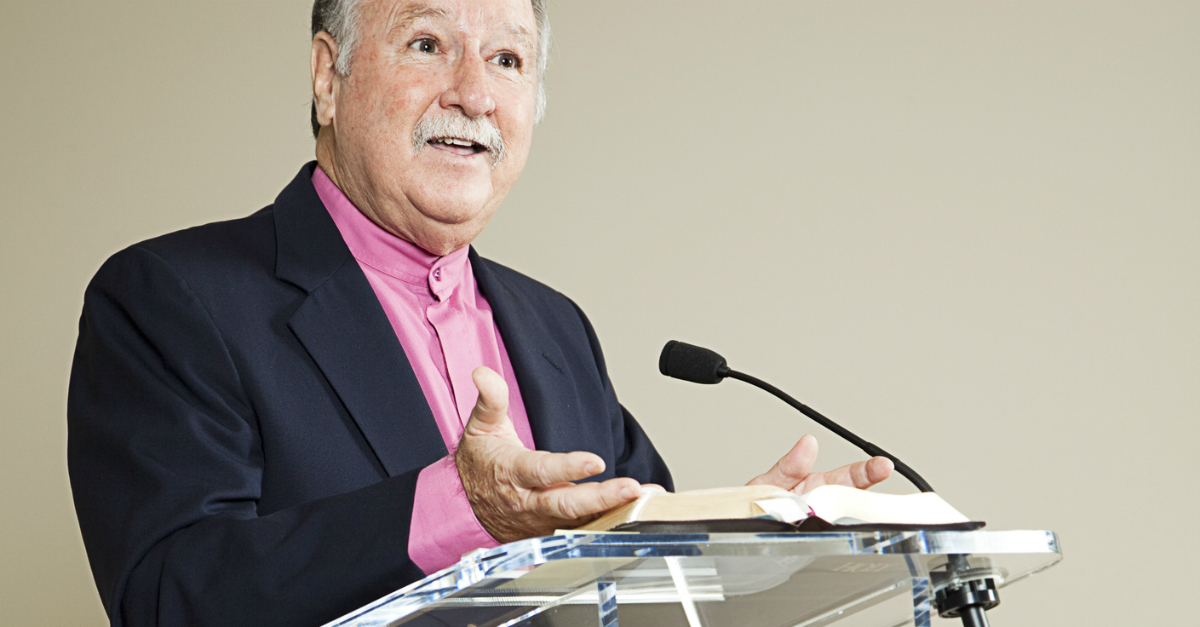
“Today I will walk in the power of the living Lord and not in my own strength or courage. Lord, help me realize that You are my sufficiency. Without You, I can do nothing.”
Promise #146
I will show you the mysteries of My kingdom.
Matthew 13:11 (WEB)
He answered them, “To you it is given to know
the mysteries of the Kingdom of Heaven,
but it is not given to them.
In today’s passage of Scripture, Jesus tells His disciples that it was His Father’s plan for them to know the mysteries of the kingdom. Jesus had just finished telling the crowds the parable of the sower and the seed and then He took the time to explain to His beloved friends the meaning of this story.
Jesus did this because it wasn’t His intention to keep His disciples in the dark. His desire (and His Father’s desire) is always to deepen our level of revelation of the vastness of the kingdom in which we are called to live in. He doesn’t want us to be left in the dark because we are called to be children of light!
It gives our Father great pleasure to give us His kingdom. (Luke 12:32) In John 5:19-20, Jesus made this statement… 19 Jesus gave them this answer: “Very truly I tell you, the Son can do nothing by himself; he can do only what he sees his Father doing, because whatever the Father does the Son also does. 20 For the Father loves the Son and shows him all he does. Yes, and he will show him even greater works than these, so that you will be amazed. (NIV)
Our God and Father loves to show us what He is up to by the Spirit which He has given us. May each one of us see an increase of revelation into the mysteries of the wonderful kingdom of God in the coming days and with childlike awe and wonder be totally blown away by our Dad’s goodness.
TRUSTING GOD DAY BY DAY
Truly Know God





 |
The Prayer Chair KELLY BARBREY Lee en español |
“In the morning, while it was still very dark, he got up and went out to a deserted place, and there he prayed.” Mark 1:35 (NRSV)
I remember an old wingback chair from my childhood home. It belonged to somebody else in my family even before it made its way to my parents’ home, and it’s been re-upholstered so many times that it’s worn everything from a thick yellow brocade in the 1950s to a pink flame stitch in the 1980s.
It currently sits in my living room, living its best new life in freshly upholstered sky blue faux leather. When you’re sitting in it, you’re almost enveloped in blue.
It’s my prayer chair. And making my way toward it each morning was the first step to finding a rhythm in my lacking prayer life.
Mark 1:35 says of Jesus, “In the morning, while it was still very dark, he got up and went out to a deserted place, and there he prayed.” This verse resonates with me because although I place importance on my family and my work, those things certainly don’t hold a candle to the miracle-working, sick-healing, masses-rallying wonder of Jesus. And even He needed to take quiet moments alone to pray.
Do you ever get distracted when you pray?
For me, the moment I sit down, I think of a reason I need to be up. The clothes need to be transferred from the washer to the dryer. A child wakes up early and wanders in. A social media alert dings and foolishly beckons my attention away. Not to mention that I feel guilty taking time to be by myself.
It’s different for everyone, but here are a few things I’ve found that help me keep a consistent prayer life:
- Designate a Prayer Chair: For me, it’s the blue chair, but for you, it could be the left side of your cozy sofa, your kitchen table or your back-porch swing. Having a consistent place to “report for battle” takes some of the guesswork out of the process. Hint: It might not be the first place you try. You may have to test out a few spots before finding one that feels right to you.
- Find a Dedicated Time: Early mornings work for me because they’re the only time I’m ever alone. For you, it might be your lunch break, right before bed or after the kids leave for school in the mornings.
- Start with Gratitude: It could be something simple, such as giving thanks for the warm blanket around you or the hot cup of coffee in your hands, but I’ve found that if I start there, the gratitude begins to flow to every area of my life.
- Candidly Confess: Lift the burdens weighing you down by confessing when you have fallen short, in big ways or small. Perhaps you inadvertently spoke harshly to a loved one or have let your selfish wants overpower the desire to help others.
- Humbly Ask: Although God knows all and sees all, ask Him humbly for what is important to you, whether to heal your sick friend, watch over a child, or guide important decisions in your life. Even though God knows the desires of our hearts, it pleases Him when we pray.
- Accept God’s Will Over Your Own: This might be the hardest part, especially if you’re a control freak. Leaving our humble requests at the feet of our Lord allows us to relinquish control and let God’s plan unfold. Our heavenly Father wants good gifts for us, as illustrated in Luke 11:11, “Is there anyone among you who, if your child asks for a fish, will give a snake instead of a fish?” (NRSV) As challenging as it can be, let’s trust that God wants what is best for us.
- Let Go and Live Free: I feel so free after my prayer time. I can face the day knowing I’ve placed my cares and struggles at God’s feet, mindful He is with me throughout the day and guiding my thoughts and decisions.
Do I have perfect attendance every day in my prayer chair? No, but it’s hard to walk by it in the morning without the beckoning call to sit a spell in the presence of God. Some mornings, my visit with God is short, and other days it’s lengthier, but I’m always glad I came.
Dear heavenly Father, please stir a desire in me to visit with You each day. Help me stay focused in my prayer time and avoid the daily distractions during my visits with You. Help me find the words to talk with You as a friend, and at the same time, see the awe and majesty of being able to sit in Your presence in prayer. In Jesus’ Name, Amen.
TRUTH FOR TODAY: Matthew 6:6, “But whenever you pray, go into your room and shut the door and pray to your Father who is in secret; and your Father who sees in secret will reward you.” (NRSV)
Romans 8:26, “Likewise the Spirit helps us in our weakness; for we do not know how to pray as we ought, but that very Spirit intercedes with sighs too deep for words.” (NRSV)
RELATED RESOURCES: Are you weary from walking through an overwhelming season? Focus your mind on God’s faithfulness with Hearing the Voice of God: A Guided Prayer Journal Bundle. This bundle includes the 30-day prayer booklet, Hearing the Voice of God: A Guided Prayer Journal, and Lysa TerKeurst’s Say Yes to God prayer journal. Center yourself in a life of prayer by training yourself to hear God’s voice. Purchase your bundle today!
CONNECT: Connect with Kelly Barbrey on her website and Instagram.
REFLECT AND RESPOND: What are some good practices in your prayer life? What are some things you could change to strengthen your prayer life? Share your ideas in the comments section!
© 2020 by Kelly Barbrey. All rights reserved.
Proverbs 31 Ministries
630 Team Rd., Suite 100
Matthews, NC 28105
www.Proverbs31.org

Love Puts Him First

[Love] is not self-seeking. (I Corinthians 13:5 CSB)
Father, there is a constant battle within to do my will rather than Yours. I want to go my way, fulfill my dreams, and do it all on my timeline. But it’s a battle because I sincerely want to seek Your will and fulfill Your calling and purpose. Please help me put self aside and remain focused with a full heart of obedience to serve You and put others’ needs before mine. And help me to truly trust that Your ways hold blessing beyond what I could ever accomplish for myself. In Jesus’ name.
Amen.
This is an excerpt from A Prayer a Day for Hope and Encouragement from DaySpring. If you are enjoying this series, you can purchase the book to experience 365 days of prayers and Scripture for hope and encouragement.
![]()

What Should Christians Work Toward after COVID-19?
- Dr. Michael A. Milton
- Author

On Sunday, November 20, 1983, 38,550 households in the United States stopped what they were doing to tune in to an ABC television film, The Day After. The film was made in some of the most nervous times of the Cold War (1947-1991). The Day After depicted a nuclear first strike by the Warsaw Pact nations (the Soviet Union controlled counties) against NATO (Britain, Western Europe, and North America). The apocalyptic event happens near Fort Riley, Kansas. The film, which generated extraordinary responses around the country, centered on what life would look like in the American Midwest—thus, “the day after.” The “Day After” became, then, a recognized expression about those epochal moments in time that transforms human society. In such events, there is a juncture inserted, usually, with unwanted disruption, into our lives. This disruption causes us to know life before the event, and life after the fact.
We have lived through several such real-life events that carried a “day after” effect. Notably, September 11, 2001, remains a significant turning point in Western culture. There are others. Generations living in community will undoubtedly point to the significant milestones in their own respective group: Pearl Harbor, or, perhaps, the assassination of President John F. Kennedy. These days became points of reference: life before, life after. So, yes, if the Lord tarries, I do think COVID-19 is going to have “a day after.” In fact, I think most of us intuitively understand that something has now changed. That we are asking the question proves the point.
Our New Watershed Event: The Coronavirus Pandemic
The coronavirus has already altered many aspects of our everyday lives. The coronavirus that caused us to learn the phrase, “social isolation” will undoubtedly cause us to also learn new ways of living. Social isolation is, now, sadly, a necessary way we must live. Soon, we pray, the precautionary measures to stop the threat of further contagion will no longer be needed. Then, what? What have we learned? What will change? How will we change? These are questions being asked by scholars, educators, medical experts, business owners, corporate executives, trade workers, and government officials. It is also a question that Christians might ask about their lives as disciples of the Lord Jesus Christ. How will the COVID-19 event change our lives as disciples of Christ?
There Will Be Lifestyle Implications
First of all, we will all experience some degree of change, whatever one’s faith or lack of it. Medicine, the field at the forefront of this crisis, has, by now, adopted new modalities that will likely not go away when the virus dies under the summer sun. I think all of us would agree that the introduction of telemedicine is a powerful resource to reach more people with fewer costs. Other sectors like higher education have been on a ramp towards online course delivery. COVID-19 pushed higher education into a full embrace of technology in the service of learning. If any were lagging behind the trend before, they are now doing penance. For, hereafter, online education is probably the new norm. On and on, we could go. Some modifications will be temporary. Other new behaviors we learned in a crisis will become valued lifestyle changes in a renewed economy. Still, additional adjustments will quickly be dispatched with good riddance. Of course, some lessons will be lost. We will repeat the mistakes we made before the virus outbreak. Soon, we will forget why we do the things we do. This, too, is inevitable. But what of faith?
What Does the Bible Say about Change?
There is an equation that appears in several places in Scripture. The formula is put forth in a conditional clause: “If this, then what?” The simple grammatical calculation is always based on a prior or antecedent event. Since some are so (e.g., “Since we know that it rained yesterday, then . . .” Or, since you have experienced falling in love, then . . .?”), then something else is possible. In the arsenal of a teacher, the conditional clause is a powerful instrument. In the context of the inerrant and infallible Word of God, the conditional sentence becomes a powerful moral possibility.
“Therefore, since all these things will be dissolved, what manner of persons ought you to be in holy conduct and godliness” (2 Peter 3:11, NKJV). In this passage, the Apostle Peter teaches about the limitations of time. Christ is coming again as Savior and also as Judge. So, Peter inserts a transitional word: “therefore.” And he asked Christians in Asia Minor, “since these things are coming, what matter of people are you to be?” Do you see the equation? “Since this, then what?”
The equation appears in the ministry of our Lord Jesus Christ. Dr. Luke writes about the event in Luke 13:1-5. The great missionary physician writes that there have been a notable and horrible incident that it happened with Galileans. Pilate, the notorious political beast, a Machiavellian figure if there ever was one, had apparently mingled the blood of the Galileans with their sacrifices. Luke says that “there were some present at that very time who told him” about the incident. Jesus’s response is to refute and preclude any idea that human catastrophe should necessarily be linked with God’s judgment. The Lord then moves to the equation before us: “no, I tell you; but unless you repent, you will all likewise perish” (Luke 13:3 ESV). Immediately after saying this, Jesus adds another localized news account of a tower that fell in Siloam. Eighteen souls perished in this accident. Once more, the Lord responds that one must not deduce from this calamity that the 18 souls “were worse offenders and all the others who lived in Jerusalem” (Luke 13:4). Jesus then raises the equation: “No, I tell you; but unless you repent, you will all likewise perish” (Luke 13:5). And there is the “Since this, then what?”
The Christian Life the Day After COVID-19
We are now faced with a “since this, then what” time in our lives as believers. Since the pandemic, how now should we live? How shall we change? I believe that at least three responses are before us. The first response to the coronavirus might be this:
1. Since COVID-19 produced isolation, let us pray for community.
As I write this, I am preparing for a Sunday service. The truth is, though, that I will conduct a worship service and preach from my library—just like a thousand other preachers. We can do much through the means of distance technology. However, when it comes to the “passing of the peace” (or “the greeting”), we know something important is missing. For we worship not as individuals, but as the Body of Christ.
A pastor called me just a few days ago. He was feeling lonely. He missed the flock of Christ. I told him that this season is a unique time and that his yearning for others is a sign of the power and presence of the Holy Spirit inside of him. I told him that his vocation was strong. We should desire to be with each other. The Bible reminds us that we should never give up the meeting together. We cannot learn forgiveness and isolation. We cannot practice love while we are always apart from each other. We might even come to learn that the occasional pain we experience in church life because of some thoughtless statement or controversy will decision is just a sign of fire humanity. We might discover that it is for these very reasons that we truly need each other. We’ve got to work through the residue of sin runs through our spiritual veins. On “the day after” COVID-19 I pray that our longing for community will result in overflowing churches, new churches, and revitalization of formerly cold churches. If we’ve learned anything we’ve learned that we really need each other. Maybe we will read the passage from Hebrews with a new sense of urgency:
“Let us hold fast the confession of our hope without wavering, for he who promised is faithful. And let us consider how to stir up one another to love and good works, not neglecting to meet together, as is the habit of some, but encouraging one another, and all the more as you see the Day drawing near“(Hebrews 10:23-25 NKJV).
I have another prayer. It is this:
2. Since COVID-19 caused social distance, let us pray for Christian unity.
Since our lives have been affected by the coronavirus we have seen the value of the unity of all believers. COVID-19 created social distancing and self-isolation. However, we learned that through technology we could connect with other believers. Finding Christian community in an adverse climate is nothing new. Christians in communist countries had to find Christian community in times of persecution. The same is true for believers in many parts of the world. One of the things that you learn is that we have more in common than not. Rather than seeking the differences in each other, we look for the similarities. This is absolutely necessary in an age of anxiety. Many of us will be tempted to forget these truths in the months ahead. We will be tempted to go back to the way things were before. There is nothing wrong with the expression of diverse traditions and backgrounds and even organizations within Christianity. However, to find our identity in these differences is to deny the catholicity that Jesus urged upon us: “For he who is not against us is on our side” (Mark 9:40). We cannot forget the prayer of Jesus which became necessarily fulfilled in our lives during the COVID-19 crisis: “That they all may be one, as You, Father, are in Me, and I in You; that they also may be one in Us, that the world may believe that You sent Me” (John 17:21 NKJV).
Finally, I pray this pandemic, and the innovative ways we learned will not be wasted. I think I would put it like this:
3. Since COVID-19 forced innovation in communication, let us pray that technology will be used for evangelization.
Haven’t you just been amazed at how churches and other ministries have been able to leverage technology to bring the life of Jesus to the world? And we all know that in difficult and desperate days, people are more open to hearing the gospel of Jesus Christ. Have we not been shown a new “Roman Road” over which we can bring the gospel to the ends of the earth? Someone told me, “Technology is the main culprit of so much of the sin that is going on today. It carries the disease of sin.” Naturally, I agree; yet, the power of the cross is that the very things that seek to destroy us become in the hands of a loving and sovereign God the very things that say this. This is the gospel story — the old, old story of Jesus and his love — that is told in the lives of men and women, boys and girls, throughout history. We can see that the ruling motif of the powerful paradox of the cross at work in the stories from Scripture. Consider this one text from Dr. Luke’s account of the “Acts of the Apostles:”
“At that time, a great persecution arose against the church which was at Jerusalem; and they were all scattered throughout the regions of Judea and Samaria, except the apostles. And devout men carried Stephen to his burial and made great lamentation over him. As for Saul, he made havoc of the church, entering every house, and dragging off men and women, committing them to prison. Therefore those who were scattered went everywhere preaching the word” (Acts 8:1-4 NKJV).
This text of Scripture is filled with the paradoxical power of the gospel. Consider these ways we see the upside-down, enigmatic, divinely arranged, glorious, transformative power of the cross activated like yeast in the dough:
1. “At that time…” God used an extraordinary time to bring about the fulfillment of Jesus’s promise that the gospel would be preached and to the ends of the earth. The coronavirus crisis did not surprise God. Though God is not the author of evil, and God is a loving God, nevertheless, he is God and ordains whatsoever comes to pass. Without being culpable for any of the sins of a fallen world (including its virulent diseases of body and soul), the Lord is absolutely sovereign. He can use the very things that would hurt us to bring about good for us. As he did in the days of the apostles God will do so today.
2. “A great persecution arose…” It has been said before that the blood of the martyrs is the seed of the church. Once again, our sovereign God is in no way caught off guard by the diabolical plotting and persecution against his people. He cannot be charged with hurting his own little lambs, and yet he knows in some Mysterious Way, God knows. And again, it was this persecution against Christians that led to the believers being scattered throughout the Roman Empire. The Roman roads that were constructed to withstand the weight of chariots and troops that marched into Jerusalem to crucify Christ and to persecute his people became the very highways that God used for Christians to travel throughout the Roman Empire. There is nothing inherently good about the pestilence of COVID-19 or the economic and social catastrophe that it brought. However, God is able to use all things, even bad things, to bring about his will. Just as he used persecution to bring about the evangelization of the world, God is using this health crisis to bring about His mission in our generation. God is already redeploying the innovations we learned to battle a virus in the service of His mission in the world today.
3. “They went everywhere preaching the word.” As persecution of Christians led to the proclamation of Christ, so, too, the Lord will use a time of crisis to bring in a time of refreshing.
But of course one of the things it will not change will be human nature. Some of us will file away the lessons learned. Some of us will put away the innovations developed. And some of us will waste away in spiritual isolation from each other and from God. The Bible says that greater is he who is in us than he was in the world (1 John 4:4). The Lord declares that he is doing “a new thing” (Isaiah 43:18-10). The Bible clearly teaches us that we are new creations in Christ (2 Corinthians 5:17), “The old has gone, the new is here!” The story of the gospel is the story of an empty tomb and a new life. What if we begin to emerge from this long winter of isolation into a new sunlit season of community, unity, and outreach? And what if all of this happened during the season of Easter—when we recall the resurrection of Jesus? Or what if “the day after” came during the season of Pentecost—when we proclaim the empowering of the Holy Spirit to reach the nations for Christ? Well, we might just conclude that God was with us, after all. We might just embrace “the day after” as a new opportunity for living, for serving, and for living life together.
With this prayer, I offer you a closing benediction: That you and your family may know the grace, mercy, and peace of the One true God: Father, the Son, and the Holy Spirit. Yours Faithfully, Dr. Milton
Bibliography
- Auden, W. H. Nones. (Poems, By) W.H. Auden. New York: Random House, 1950. https://books.google.com/books?id=ZAI2cgAACAAJ.
- Auden, W.H. “The Fall of Rome.” Text. Poets.Org. Last modified 1951. Accessed March 25, 2020. https://poets.org/poem/fall-rome.
- Ferreiro, Alberto. The Visigoths: Studies in Culture and Society. Vol. 20. Brill, 1999.
- Schaff, Phillip. “Nicene and Post-Nicene Fathers: Series II/Volume VI/The Letters of St. Jerome,” 2007. Wikisource.
- Tearle, Oliver. “A Short Analysis of W. H. Auden’s ‘The Fall of Rome.’” Interesting Literature. Last modified February 24, 2020. Accessed March 25, 2020. https://interestingliterature.com/2020/02/fall-rome-analysis-auden/.
Photo credit: ©GettyImages/gyn9038
Michael A. Milton, Ph.D. (University of Wales; MPA, UNC Chapel Hill; MDiv, Knox Seminary) Dr. Milton is a retired seminary chancellor and currently serves as the James Ragsdale Chair of Missions at Erskine Theological Seminary. He is the President of Faith for Living and the D. James Kennedy Institute a long-time Presbyterian minister, and Chaplain (Colonel) USA-R. Dr. Milton is the author of more than thirty books and a musician with five albums released. Mike and his wife, Mae, reside in North Carolina.
![]()

6 Reasons Socializing Is Critical for Mental Health
- Candice Lucey
- Contributing Writer

Psychologists, counselors, doctors, and the Bible all promote positive relationships for mental and physical health.
Everyone at every age needs friends: “throughout life, close friends provide a strong foundation of compassion and trust for many people, and they can become even more important as we age.”
Here are six ways that socializing promotes mental health:
Photo Credit: ©GettyImages/Rawpixel

1. Encouraging a Healthy Lifestyle
It’s easy to get into bad habits, both emotional and physical, without people to keep us accountable. Galatians 6:1 puts it this way: “if anyone is caught in any transgression, you who are spiritual should restore him in a spirit of gentleness.”
When others see us, we are more likely to take a close look at what we eat, what we say, how we act, and even how we think. Is our tone of voice kind or harsh? Are we sharing? Grumpy? Compassionate? Greedy? Rude? Lazy?
Friends encourage one another to eat well for good mental and physical health. They challenge each other to be positive and to consider others’ needs.
When we emulate the positivity and compassion of our peers, we simply feel better.
Photo Credit: ©GettyImages/Ridofranz

2. Preventing Depression and Anxiety
Too much “self” promotes depression and anxiety. “High and low self-esteem are two sides of the same coin […] preoccupied with the self,” while they both “supplant God as the center of one’s life.” This quote comes from Tim Keller’s book The Freedom of Self Forgetfulness where he explains how self-involvement robs “Christians of meaningful purpose and life-giving joy.”
Godly friends help us to keep Christ at the center of our lives and, by doing so, help us cling to joy.
Notice how Colossians 3:16 encourages ‘one another’ living: “Let the word of Christ dwell in you richly, teaching and admonishing one another in all wisdom, singing psalms and hymns and spiritual songs, with thankfulness in your hearts to God.”
Photo Credit: ©GettyImages

3. Finding Purpose
After retirement, a person might wonder what he is supposed to do with his life. People don’t need him as much as they did when he managed a company, taught school, worked as a line cook, or fixed car engines.
Friends remind a retiree that there is still purpose in life: to keep growing and learning. With fewer responsibilities, this is a great time to get to know God better; to really learn about Him. Finding purpose is often easier as part of a Bible study, prayer team, or care group than in isolation.
From adolescence onwards, one might think that a successful life involves making money and achieving career status, but the real reason we are here is to know God, love Him, and to glorify Him. “For we are his workmanship, created in Christ Jesus for good works, which God prepared beforehand, that we should walk in them.” (Ephesians 2:10)
One way He speaks to us is through relationships. These relationships also offer opportunities to find purpose as mentors and to continue being mentored, even in our 60s, 70s, and beyond. “Give instruction to a wise man, and he will be still wiser; teach a righteous man, and he will increase in learning.” (Proverbs 9:9)
Photo Credit: ©GettyImages/Gorodenkoff

4. Holding on to Memory
“One study found that cognitive abilities declined 70 percent more slowly in individuals who had frequent social connections compared to those who had little social contact with others.”
You can see that when a person is isolated, she tends to forget things more easily. She isn’t accountable to anyone. She doesn’t have to remember engagements or speak to anyone. With less purpose, memory slips away; at least short-term memory. Socialization may improve memory.
Our memories are important to us, especially when we are hurting emotionally. “But the Helper, the Holy Spirit, whom the Father will send in my name, he will teach you all things and bring to your remembrance all that I have said to you.” (John 14:26)
A good memory more easily calls to mind the teachings of Christ. When we need His encouragement and covet His guidance, a good memory will recall life-giving words or at least remember where to find them.
Photo Credit: ©GettyImages/IPG Guttenberg

5. Discipleship: Helping Others Grow
We always have something to offer as mature Christians, even if we are young in faith but rich in life experience. Socializing helps us stay mentally and spiritually fit, and we also have a responsibility to encourage mental and spiritual health in our peers through discipleship.
We can impart our passion for Christ and support people in our own age group or young Christians. While it’s tempting to stick with our contemporaries, younger people need to be mentored. “One generation shall commend your works to another, and shall declare your mighty acts.” (Psalm 145:4)
As one who came to Christ in my thirties, with a non-Christian background and no believing elders in my family, I am so grateful for the older women in my church who have taken the time to patiently teach, correct, and encourage me through the Word of God.
New Christians at any age benefit from elders with wisdom to spare. Discipling younger believers is obedient and also has a positive effect on mental health: “Looking up to your elder spiritually is very affirming to him.”
Photo Credit: ©GettyImages/lisafx

6. Encouraging Empathy
The speck in another person’s eye is glaringly obvious when we never see ourselves through the eyes of others. We speak harshly about people who are different from us, forgetting how we appeared to God before Christ saved us.
Now we stand before the throne of God, washed clean by the blood of the lamb, and we are called to reach out to others with that message of hope. We are not to judge but to act out our faith by clothing, feeding, teaching, and comforting others.
God commands us to spread a message of hope which, by its very nature, involves socialization. Although this is an act of obedience, a life lived on mission tends to provide a person with greater empathy which “connects you to other people
in deep and meaningful ways.”
Connectedness will save us from losing our memories, feeling depressed, and from feeling as though life is meaningless as we age. God is a relational God after all; He said from the beginning “it is not good for man to be alone.” (Genesis 2:18)
The Lord was working from His own perfect, triune model—perfect relationship with Jesus and the Holy Spirit.
Photo Credit: ©GettyImages/Seventy-four
 Candice Lucey lives with her family in a mountainous part of BC where she loves to write about Jesus.
Candice Lucey lives with her family in a mountainous part of BC where she loves to write about Jesus.
![]()

Walk in the Daylight

Walk in the Daylight
“Let us walk properly, as in the day, not in revelry and drunkenness, not in lewdness and lust, not in strife and envy” (Romans 13:13 nkjv).
Much of the entertainment industry wants to make bad things look good and good things look bad. They’ll take something that’s forbidden, something we know is sinful, and make it look very appealing by the way they present it.
Then they’ll take something that’s good, virtuous, and wholesome, and make fun of it or even outright attack it.
Yet the Bible tells us, “Let us walk properly, as in the day, not in revelry and drunkenness, not in lewdness and lust, not in strife and envy” (Romans 13:13 nkjv).
Let me put that into the modern vernacular: Don’t party and drink. Have you ever been in a place where a group of people are drinking, and they get louder and louder? Pretty soon no one even knows what they’re laughing at.
The Christian should be under the control of the Holy Spirit not alcohol or drugs. Ephesians 5:18 tells us, “Don’t be drunk with wine, because that will ruin your life. Instead, be filled with the Holy Spirit” (nlt).
Then there is the word: lewdness, which comes from a Greek term that simply means “bed.” It holds the same connotation as two people going to bed together. We understand that doesn’t mean taking a nap.
The word lust in this verse doesn’t merely describe a person given over to immorality. It describes someone who is living immorally but is incapable of feeling shame. It’s shameless excess and the complete absence of restraint.
In other words, this is a person who not only lives immorally, but they proclaim it. They flaunt it. They’re proud of it.
It frightens me when I hear of Christians engaging in sexual activity outside of God’s constraints, having affairs, extramarital sex, and premarital sex.
The Bible is saying that should not be true of us. So, don’t live that way.
Copyright © 2020 by Harvest Ministries. All rights reserved.
For more relevant and biblical teaching from Pastor Greg Laurie, go to www.harvest.org
and
Listen to Greg Laurie‘s daily broadcast on OnePlace.com.
Watch Greg Laurie‘s weekly television broadcast on LightSource.com.
SPECIAL OFFER
 Receive Suffer Strong: How to Survive Anything by Redefining Everything, in thanks for your gift of support today.
Receive Suffer Strong: How to Survive Anything by Redefining Everything, in thanks for your gift of support today.
Out of their long and painful journey has come a really helpful survival guide, so to speak. It’s a book called Suffer Strong: How to Survive Anything by Redefining Everything. It’s not just an inspiring story of triumph through trials but a how-to book for accepting God’s plan and recognizing His providence even when it feels like your world is shattered.
![]()

6 Powerful Life Lessons from the Book of Esther
- Lisa Ross
- LisaRossInspiration.com

The Bible book of Esther is a dramatic account which can give us insight into God’s special and purposeful plan for our lives. The story gives us six powerful lessons about courage, divine timing and God’s supreme love.
Story of Esther in the Bible
As scripture reveals, Esther is a Jewish woman living in Persia and reared by her cousin Mordecai. She was taken to the King of the Persian Empire to become a part of his harem—but because there was something special about Esther, he made her queen. Mordecai, however, didn’t tell the king about a major detail—Esther’s Jewish heritage.
I imagine Esther as a drop-dead gorgeous woman with flawless olive skin and a tantalizing personality. She charmed King Xerxes so much that after deposing his prior queen, he could have chosen any woman he wanted—but he chose Esther.
Of course there is a scoundrel in the story, too. Haman is a vengeful and egotistical advisor to the king. He hated Mordecai for refusing to bow down to him, so he plotted to destroy the Jewish people. Haman told the king, “There is a certain people scattered abroad and dispersed among the peoples in all the provinces of your kingdom whose customs are different from those of all other people and who do not obey the king’s laws; it is not in the king’s best interest to tolerate them” (Esther 3:8 NIV). The king gave him authority to handle the fate of the Jewish people. In return, Haman announced a government-issued edict of genocide.
What could the queen do for her people? The king had not requested her presence in a month. Did his affection for her wane? Was she a powerless sex partner? Of all the Jews, only Esther had access to the king. Mordecai persuaded Esther to speak to the king on behalf of the Jewish people reminding her of her unique place in history and that silence is not an option. In one of the most poetic Biblical passages, Mordecai speaks of God’s purposeful timing: “Who knows but that you have come to a royal position for such a time as this?” (Esther 4:14 NIV). In other words, Mordecai lets Esther know that even her outer beauty was for a reason and would not go to waste!
Esther knew, of course, that going to the king unsolicited could be her death sentence. Anyone who came into the king’s presence without being summoned could be executed. So what does she do? Before making a life or death decision, she calls for the Jewish people to join her on a 3-day fast. Following the fast she put on her best royal robes, approached the king, and told him of Haman’s plot against her people. The Jewish people were saved, Haman was hanged on the same gallows that had been prepared for Mordecai, and Esther received Haman’s estate. This dramatic unfolding of events moves like a novel and played like a great chess game with several life lessons. Here are six lessons from the book of Esther that we can each apply to our living.
Lesson #1: God has a plan for our lives
Mordecai nailed it when he said, “For if you remain silent at this time, relief and deliverance for the Jews will arise from another place, but you and your father’s family will perish. And who knows but that you have come to the royal palace for such a time as this” (Esther 4:14 NIV). God loved the Jewish people. And, he didn’t create Esther’s beauty and finesse for her and her alone. Esther was placed in a royal position to assist in the delivery of God’s divine plan.
Lesson #2: We are given divine moments to alter circumstances
As believers, there are no such things as accidents or coincidences. God’s timing is providential. Esther’s divine moment of providence came by accepting her responsibility to go to the king. However, Mordecai was clear when he said to Esther that she could be the one who saved the people, or not. God will use you only if you’re ready—or he will find someone else.
Lesson #3: We must stand with courage
“I will go to the king, even though it is against the law. And if I perish, I perish” (Esther 4:16 NIV). Esther was willing to die to save her people. Sometimes we must stand in courage, even when it is not popular to do so, and risk it all.
Lesson #4: Fasting and prayer brings clarity and hope for deliverance
God is not mentioned in the Book of Esther even once. But Esther was clear that in this particular situation, a heavenly response was needed for an earthly situation. Esther needed direction. When we need God’s grace, fasting and prayer opens the portals for spiritual growth, removes distractions and places us on a path to humility.
Lesson #5: God demands obedience
Esther’s obedience saved God’s people from genocide. The reality is that Esther didn’t know what would happen when she approached the king. She acted in obedience and by doing so she saved a nation and received the best. We don’t get a pass on this one.
Lesson #6: God uses everything and everybody for his divine purpose
No part of our lives is untouched. God is in control of every aspect, whether we want him to be or not, and there is nothing that is not subject to him (Hebrews 2:8 NIV). And, the best thing we can do for our lives is to search for and surrender to his will.
Lisa Brown Ross is an author and award-winning writer. Her career spans radio and television reporting, public relations and public affairs consulting, motivational speaking and leadership development. She is a wife, mother, prayer warrior, poet and “Chief Inspiration Officer” for LisaRossInspiration.com. She serves as President of the LJR Group, Inc. a public relations and crisis communications firm located in Irving, Texas.

Stop the downward spiral 🌀 {Jennie Allen}
If we’re spiraling down toward our ultimate fixation, we can flip it. We can spiral up toward God instead. ~ Jennie Allen, Get Out of Your Head

Make the Shift

by Jennie Allen
an exclusive excerpt from Get Out of Your Head: A Study in Philippians
Are you ready for a shift?
Ever wonder why it seems some people are happier than you, even if they are going through more difficult circumstances than you? Maybe you have visited Christians in developing countries thinking you were there to minister to them in their need, only to realize that in their smile and joy and selflessness, you were the one who had the need.
Yeah, me too.
When Paul wrote Philippians, the greatest exposition on joy ever written, he was actually bound in chains under house arrest. Paul apprehended something our cocoon-existence-of-comfort-in-the-West can never provide.
So this begs a second question.
What are you looking toward to make you happy?
Whether it is opioids or people’s praise, whatever causes you to experience strong emotions of either happiness or disappointment — that is likely the thing you are living for. And it is very likely ruining your life.
I remember listening as a woman confessed extreme anxiety over her kids and their futures. She was brave to say it out loud, and I listened and I related and I prayed. She was looking at me asking, “What do I do?”
But actually I think the better question is, “Who is God?”
You see, if God is good, and loving, and in control, you can put your head on your pillow even with chaos swirling and the people you love out of your control, because you know Him and you know He has them, and He has you. He has all of it. Change is difficult and may come slow — after all, these are ingrained thoughts and entangled sins. But because we have been made new creations, we have the Spirit’s power and a choice to make. Changing our minds is possible. We do not have to spin.
If we’re spiraling down toward our ultimate fixation, we can flip it. We can spiral up toward God instead.
This is what Paul did. If all Paul saw were his circumstances and his inability to change his imprisonment, he would surely have been despondent. But his circumstances didn’t dictate his thoughts. It was his love of Jesus and trust in a good, loving, in-control God that consumed his mind and his purpose. And the same power that raised Christ from the dead, the same Spirit that empowered Paul to trust in the direst circumstances, is fully accessible for you and me. Right now. Are you ready for that shift?

Read Philippians 1
Read chapter 1 once all the way through without writing anything. Then read it again. On your second read, begin to jot down words and phrases that jump out to you. Get ready — this letter reads like a “best of” list of favorite and most quoted verses in the Bible.
As you read chapter 1, respond to the below:
- Write down some of the things you see that Paul is grateful for.
- In verses 9 and 10 what does Paul want for the Philippians and why?
- Read verses 15–17. What is the problem and how does Paul reconcile this?
- Rewrite verse 21 in your own words.
- Verse 27 talks about a “manner of life worthy of the gospel.” Describe what Paul means by this. Look at verses 27–30.
- Now read back through all of your responses and write down some themes. I want you to write a summary statement of Philippians 1.
Example: The goal of the enemy is to have us love more than God. God’s desire is we love Him most.
PHILIPPIANS 1 SUMMARY STATEMENT
You shall love the Lord your God with all your heart and with all your soul and with all your mind and with all your strength. — Mark 12:30 ESV
J. I. Packer, in Knowing God, says,
What were we made for? To know God. What aim should we set ourselves in life? To know God. What is the “eternal life,” that Jesus gives? Knowledge of God. [John 17:3] What is the best thing in life, bringing more joy, delight, and contentment than anything else? Knowledge of God. [Jeremiah 9:23] What, of all the states God ever sees man in, gives Him the most pleasure? The knowledge of Himself. [Hosea 6:6]1
To live is Christ and to die is gain. — Philippians 1:21 NIV
A consuming mission for Paul. “To live is Christ…” is Christ. What interesting phrasing. It’s not primarily an action. It is a state of being. It is to be with and to allow Christ to be in and through and with me as I live. It is less of a hustle and more of a state of being.
My son Cooper is adopted from Rwanda, and there are times when he will say to me, usually when we are punishing him for something, “I don’t want to be in this family anymore.” His actions and words are trying to change something unchangeable. He is an Allen. It is his reality no matter how he feels about it and no matter how he acts or doesn’t act.
Getting out of our own heads begins with understanding our position in Christ. We are His, and we live that out as a matter of fact… either aware and surrendered to that truth or in rejection to what is true.
To live “is Christ.”
- Our position is as a member of Christ’s body. “Now you are the body of Christ and individually members of it” (1 Corinthians 12:27).
- Our minds are the minds of Christ. “‘For who has understood the mind of the Lord so as to instruct him?’ But we have the mind of Christ” (1 Corinthians 2:16).
- Our lives making Christ’s appeal. “Therefore, we are ambassadors for Christ, God making his appeal through us” (2 Corinthians 5:20).
The more we understand our position with Christ, in Christ, through Christ, the less we try hard and the more we surrender.
Surrender.
It is the least active thing you can imagine doing.
Today I was all worked up about something I could not control at work. I was in knots about it and honestly it consumed my mind and time and even my mood all day.
Tonight I fell into bed and exhaled. I gave up. I told God what was true all along: “I lay here at Your mercy.”
We can hustle at His mercy; we can worry at His mercy or we can rest because of His mercy.
Being wholly surrendered to one thing will shift everything about us.
Whatever you find your mind most fixed on — that is the thing you are living for.
SPIRALS
Our spirals can go one of two ways: up toward God or down toward the thing we’re fixating on. In the coming weeks we’ll start examining and dissecting our spirals and what to do about them, but for now we need to know that direction is everything. We want to go up, not down.
Here’s how a typical downward spiral looks.

Our emotions trigger a thought. For example, feeling overwhelmed might make us think, I’ll never get through all this and there’s no use trying. Thoughts lead to behaviors (like numbing or procrastinating); behaviors affect relationships (like the ones we shut out or put off to nurse our overwhelmed minds); and then there are consequences. Friendships grow stale, opportunities are missed, we’re left with things we don’t want. But those things make up our lives. It can start to get out of control.
In this study we’ll dig into each level on this spiral. But for now, know that when we spiral down, it’s because we’ve set our minds on something that isn’t God.
Here’s what it looks like to spiral up instead:

This spiral starts with a stance of surrender toward God that reminds us we are His, He is working through us, and we have a choice. So, when we’re faced with the emotion that threatens to send us downward, we take hold of one thought: I have a choice. We learn to choose thoughts that conform to the mind of Christ; we start seeing better behaviors, better relationships, and better consequences. Our hearts are “set on what the Spirit desires” as Paul put it. Focused on God, our spirals begin to flip.
I love that Paul says we have a choice about what we think, no matter what the world is throwing at us. Often I sit down with women, and I hear their stories, and it doesn’t matter what country or city we’re in, the struggles are the same.
The people who stand out to me are the ones who have chosen to trust Jesus more than trusting their ability to make everything work out fine.
These heroes of the faith are not subject to their own thoughts. They are not subject to their feelings.
They believe in one chief aim, and with every ounce of their power, they are working to think about Christ.
Jesus is the axis around which all their thought spirals spin. When their minds turn and turn, they fixate on Him. I want to learn to do the same.
Read Romans 8:5-11. In light of what you read, answer the questions:
And what do You want for me?
1. J. I. Packer, Knowing God (Downers Grove, IL: Intervarsity Press, 1993).
Excerpted with permission from Get Out of Your Head Study Guide by Jennie Allen, copyright Jennie Allen.
* * *
Your Turn
What are your answers to the questions: Who are You, Lord? And what do You want for me? Come share with us on our blog.
P.S. Don’t forget that registration is open for the Get Out of Your Head Online Bible Study starting in just one month! Come join our summer women’s study with Jennie Allen! Learn more below…

Stop the Spiral of Toxic Thoughts and Be Strengthened in Your Mind and Heart
GET OUT OF YOUR HEAD: A Study in Philippians
Online Bible Study by Jennie Allen
starts June 22
Join now to receive:
1) FREE access to all 6 video sessions with Jennie
2) Jennie Allen’s Thought Assessment Guide
3) A free download of the first session of the study guide workbook
4) And beautiful Scripture printables of Philippians 4 verses
Watch the Video with Jennie

